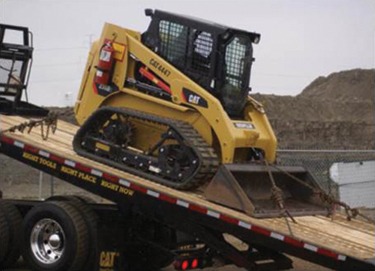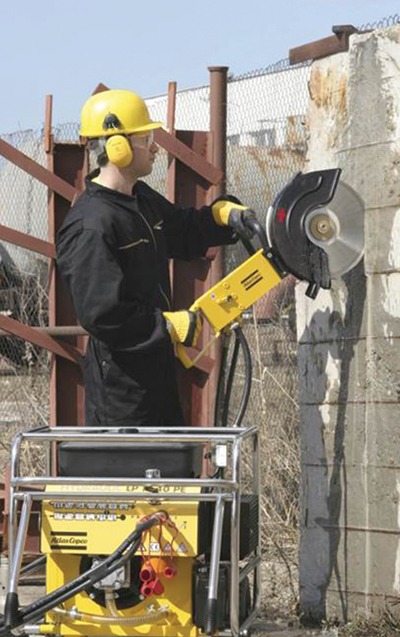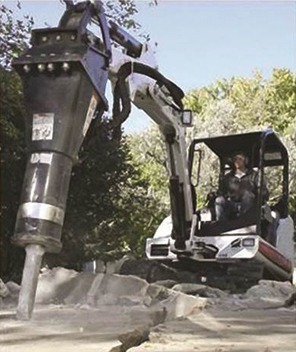April 2016
Perspective 1:
Advice From the American Rental Association
 Equipment rental industry revenues have been growing at a strong pace over the last several years, and that trend is expected to continue through 2019 and beyond. The American Rental Association (ARA) recently released the latest quarterly forecast from its ARA Rental Market Monitor™ subscription service, indicating total revenue growth in the U.S. to be 6.6 percent in 2016.
Equipment rental industry revenues have been growing at a strong pace over the last several years, and that trend is expected to continue through 2019 and beyond. The American Rental Association (ARA) recently released the latest quarterly forecast from its ARA Rental Market Monitor™ subscription service, indicating total revenue growth in the U.S. to be 6.6 percent in 2016.
Of this particular growth, the construction/industrial segment is forecast to grow 6.7 percent for 2016, with the general tool/DIY market segment reaching 6.8 percent growth.
There has also been significant growth in rental penetration for construction and industrial rental in recent years. The ARA Rental Penetration Index™ measures the proportion of the total fleet of construction machines that are owned by equipment rental companies. The index is value-based and uses original equipment cost as the primary factor to calculate the ratio of rental.
“Over the last several years, the performance of the equipment rental industry has been very positive. Equipment rental companies can prepare for growth with confidence and ensure their inventory is ready to meet the growing demand of rental,” says Christine Wehrman, ARA CEO and executive vice president.
The increase in equipment rental can be attributed to the many benefits that equipment rental has to offer and has changed the way that business is done for many construction professionals. It has become understood that renting is an effective way to manage and operate a business, while helping get projects done in an efficient and economical manner.
To help contractors and construction companies determine whether renting a piece of equipment is the right decision, ARA suggests the following rules:
- Look at the cost of renting versus buying and consider the time value of money.
- Estimate the time utilization of a piece of equipment. If you are not going to utilize the equipment to its fullest extent, why pay to own it?
- If your jobs are varied and require special equipment, rental may be the most efficient way to get the job done.
- If your fleet’s diesel emissions are controlled by regulation, renting the necessary equipment is a simple solution.
Some of the most basic benefits of equipment rental for construction companies are:
- Frees up capital for other demands and a stronger balance sheet.
- Supplements your fleet with specific equipment, allowing you to compete for more jobs.
- Uses the right tool for the right job while eliminating maintenance and upkeep costs.
- Ensures equipment that meets regulatory specifications for all types of construction projects.
- Eliminates warehouse or storage demands.
Renting offers contractors and construction companies access to a wide variety of equipment for added job versatility without the added financial burden associated with the byproducts of ownership, including the cost of spare parts inventory, regular maintenance and repair, a mechanic’s time to maintain it, transportation, insurance and storage. Rental businesses also offer specialized equipment for seasonal or niche jobs.
Perspective 2:
Factors to Consider When Renting Equipment
 Terry Hagy, president of Rental Max, spoke with Masonry Magazine about what to look for in a rental business when it comes time to rent equipment. “The rental store should be asking questions about the project or situation and what the contractor is trying to accomplish,” he says. “That way they can offer the right equipment for the job and you can get your project done safely, correctly and economically.”
Terry Hagy, president of Rental Max, spoke with Masonry Magazine about what to look for in a rental business when it comes time to rent equipment. “The rental store should be asking questions about the project or situation and what the contractor is trying to accomplish,” he says. “That way they can offer the right equipment for the job and you can get your project done safely, correctly and economically.”
Most of the time, professional contractors will deal with a rental store where there is already a relationship, and where the staff members are familiar with the type of work they do. Based on that trust and partnership, contractors can then consider three factors when renting equipment:
- Availability — Is it in stock?
- Reliability — Will it work well?
- Value — Is it priced fairly?
In addition to these three main factors, a contractor will also want to consider the store’s location, whether equipment can be delivered, and whether the business has newer, well-maintained equipment. Mr. Hagy advises, “Check service tags on the equipment to make sure it was serviced properly.”
Finally, Mr. Hagy points out that renting makes sense if you’re not getting a 60% utilization/ROI out of a piece of equipment. “Look at variable cost instead of fixed cost,” he says. “When you rent, you don’t have to insure, maintain and store the item. If you own it, you have costs 12 months out of the year.”
Perspective 3:
Scaffold Rental
Clint Bridges of EZ Scaffold also offers his perspective to Masonry Magazine regarding rental, particularly scaffolding rental.
Q. Does your company rent scaffolding?
A. Yes. We rent everything we sell, including mast climbers, crank up, and frames. We also do installation and dismantling.
 Q. Are people renting parts or full systems?
Q. Are people renting parts or full systems?
A. Both. Some contractors have equipment and just need to go higher or longer. Others don’t have equipment or the right type of equipment and need to rent everything. For example, they may primarily do work that does not require much scaffold but have the opportunity to do a larger job and need the equipment to do that job. The contractor will rent because he may never do this type of job again. That’s the nice thing about renting from a company like EZ Scaffold. We’ll rent you a wing nut if that’s what you need.
Q. Is more rental going on now than in previous years, or less? Why do you think this is so?
A. More for sure. The construction industry has picked up nationwide. Rental was good during the recession because a contractor would get a job but not have another one to justify buying the equipment, so he would rent. Now, however, people have more work than they have equipment for.
Q. What type of client is renting most?
A. Masons are our primary customer. General contractors providing scaffold for all trades is a large part of what we do. This is good for the mason contractor, since EZ Scaffold is fast enough for all trades and has the capacity for masonry. So a mason is not limited by working on a light-duty scaffold that doesn’t hold the stock that a mason needs to be productive. The wrong scaffold can severely affect productivity.
Q. What factors should a client keep in mind when they are determining whether to rent or buy?
A. Make sure they are renting from an experienced scaffold company, someone that knows the equipment and keeps it well maintained. Getting old, worn-out equipment is not only unproductive, it can also be dangerous. Sometimes companies send out whatever equipment they have on hand so the contractor gets a patchwork of different brands and models. This makes it difficult for their employees to use the equipment competently, since each manufacturer is different. Making sure they are getting the right equipment for the job and that it is safe and well maintained is important.
Q. Why should someone buy vs. rent or vice versa?
A. The determining factor is usually whether they are going to be able to keep it on the wall. If this is a short-term, one-time application, then they should rent. If it is a long-term project or the contractor will be able to use it on future projects, then they should buy. And by all means, consult their accountant.